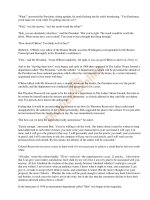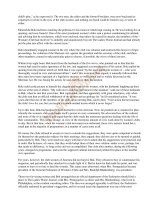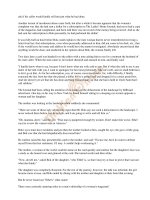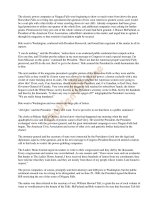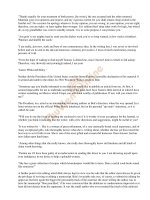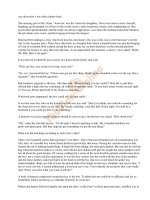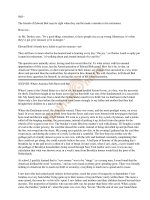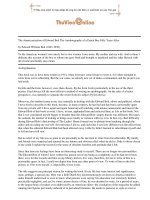The Americanization of Edward Bok 12
Bạn đang xem bản rút gọn của tài liệu. Xem và tải ngay bản đầy đủ của tài liệu tại đây (167.26 KB, 10 trang )
"What?" answered the President, sitting upright, his teeth flashing but his smile broadening. "You Dutchman,
you'd make me work while I'm getting shaved, too?"
"Well," was the answer, "isn't the result worth the effort?"
"Bok, you are absolutely relentless," said the President. "But you're right. The result would be worth the
effort. What writer have you in mind? You seem to have thought this thing through."
"How about O'Brien? You think well of him?"
(Robert L. O'Brien, now editor of the Boston Herald, was then Washington correspondent for the Boston
Transcript and thoroughly in the President's confidence.)
"Fine," said the President. "I trust O'Brien implicitly. All right, if you can get O'Brien to add it on, I'll try it."
And so the "shaving interviews" were begun; and early in 1906 there appeared in The Ladies' Home Journal a
department called "The President," with the subtitle: "A Department in which will be presented the attitude of
the President on those national questions which affect the vital interests of the home, by a writer intimately
acquainted and in close touch with him."
O'Brien talked with Mr. Roosevelt once a month, wrote out the results, the President went over the proofs
carefully, and the department was conducted with great success for a year.
But Theodore Roosevelt was again to be the editor of a department in The Ladies' Home Journal; this time to
be written by himself under the strictest possible anonymity, so closely adhered to that, until this revelation,
only five persons have known the authorship.
Feeling that it would be an interesting experiment to see how far Theodore Roosevelt's ideas could stand
unsupported by the authority of his vibrant personality, Bok suggested the plan to the colonel. It was just after
he had returned from his South American trip. He was immediately interested.
"But how can we keep the authorship really anonymous?" he asked.
"Easily enough," answered Bok, "if you're willing to do the work. Our letters about it must be written in long
hand addressed to each other's homes; you must write your manuscript in your own hand; I will copy it in
mine, and it will go to the printer in that way. I will personally send you the proofs; you mark your corrections
in pencil, and I will copy them in ink; the company will pay me for each article, and I will send you my
personal check each month. By this means, the identity of the author will be concealed."
Colonel Roosevelt was never averse to hard work if it was necessary to achieve a result that he felt was worth
while.
"All right," wrote the colonel finally. "I'll try--with you!--the experiment for a year: 12 articles... I don't know
that I can give your readers satisfaction, but I shall try my very best. I am very glad to be associated with you,
anyway. At first I doubted the wisdom of the plan, merely because I doubted whether I could give you just
that you wished. I never know what an audience wants: I know what it ought to want: and sometimes I can
give it, or make it accept what I think it needs--and sometimes I cannot. But the more I thought over your
proposal, the more I liked it... Whether the wine will be good enough to attract without any bush I don't know;
and besides, in such cases the fault is not in the wine, but in the fact that the consumers decline to have their
attention attracted unless there is a bush!"
In the latter part of 1916 an anonymous department called "Men" was begun in the magazine.
The Legal Small Print 116
The physical work was great. The colonel punctiliously held to the conditions, and wrote manuscript and
letters with his own hand, and Bok carried out his part of the agreement. Nor was this simple, for Colonel
Roosevelt's manuscript--particularly when, as in this case, it was written on yellow paper with a soft pencil
and generously interlined--was anything but legible. Month after month the two men worked each at his own
task. To throw the public off the scent, during the conduct of the department, an article or two by Colonel
Roosevelt was published in another part of the magazine under his own name, and in the department itself the
anonymous author would occasionally quote himself.
It was natural that the appearance of a department devoted to men in a woman's magazine should attract
immediate attention. The department took up the various interests of a man's life, such as real efficiency; his
duties as an employer and his usefulness to his employees; the employee's attitude toward his employer; the
relations of men and women; a father's relations to his sons and daughters; a man's duty to his community; the
public-school system; a man's relation to his church, and kindred topics.
The anonymity of the articles soon took on interest from the positiveness of the opinions discussed; but so
thoroughly had Colonel Roosevelt covered his tracks that, although he wrote in his usual style, in not a single
instance was his name connected with the department. Lyman Abbott was the favorite "guess" at first; then
after various other public men had been suggested, the newspapers finally decided upon former President
Eliot of Harvard University as the writer.
All this intensely interested and amused Colonel Roosevelt and he fairly itched with the desire to write a
series of criticisms of his own articles to Doctor Eliot. Bok, however, persuaded the colonel not to spend more
physical effort than he was already doing on the articles; for, in addition, he was notating answers on the
numerous letters received, and those Bok answered "on behalf of the author."
For a year, the department continued. During all that time the secret of the authorship was known to only one
man, besides the colonel and Bok, and their respective wives!
When the colonel sent his last article in the series to Bok, he wrote:
"Now that the work is over, I wish most cordially to thank you, my dear fellow, for your unvarying courtesy
and kindness. I have not been satisfied with my work. This is the first time I ever tried to write precisely to
order, and I am not one of those gifted men who can do so to advantage. Generally I find that the 3,000 words
is not the right length and that I wish to use 2,000 or 4,000! And in consequence feel as if I had either padded
or mutilated the article. And I am not always able to feel that every month I have something worth saying on a
given subject.
"But I hope that you have not been too much disappointed."
Bok had not been, and neither had his public!
In the meanwhile, Bok had arranged with Colonel Roosevelt for his reading and advising upon manuscripts of
special significance for the magazine. In this work, Colonel Roosevelt showed his customary promptness and
thoroughness. A manuscript, no matter how long it might be, was in his hands scarcely forty-eight hours,
more generally twenty-four, before it was read, a report thereon written, and the article on its way back. His
reports were always comprehensive and invariably interesting. There was none of the cut-and-dried flavor of
the opinion of the average "reader"; he always put himself into the report, and, of course, that meant a warm
personal touch. If he could not encourage the publication of a manuscript, his reasons were always fully given,
and invariably without personal bias.
On one occasion Bok sent him a manuscript which he was sure was, in its views, at variance with the colonel's
beliefs. The colonel, he knew, felt strongly on the subject, and Bok wondered what would be his criticism.
The Legal Small Print 117
The report came back promptly. He reviewed the article carefully and ended: "Of course, this is all at variance
with my own views. I believe thoroughly and completely that this writer is all wrong. And yet, from his side
of the case, I am free to say that he makes out the best case I have read anywhere. I think a magazine should
present both sides of all questions; and if you want to present this side, I should strongly recommend that you
do so with this article."
Sagamore Hill. April 26th 1916
This is a really noteworth story--a profoundly touching story--of the Americanizing of an immigrant girl, who
between babyhood and young womanhood leaps over a space which in all outward and humanizing essentials
is far more important than the distance painfully traversed by her forefathers during the preceding thousand
years. When we tend to grow disheartened over some of the developments of our American civilization, it is
well worth while seeing what this same civilization holds for starved and noble souls who have elsewhere
been denied what here we hold to be, as a matter of course, rights free to all--altho we do not, as we should
do, make these rights accessible to all who are willing with resolute earnestness to strive for them. I most
cordially commend this story.
Theodore Roosevelt
One of Theodore Roosevelt's "Reports" as a reader of special manuscripts"
Not long after, Bok decided to induce Colonel Roosevelt to embark upon an entirely new activity, and
negotiations were begun (alas, too late! for it was in the autumn of 1918), which, owing to their tentative
character, were never made public. Bok told Colonel Roosevelt that he wanted to invest twenty-five thousand
dollars a year in American boyhood--the boyhood that he felt twenty years hence would be the manhood of
America, and that would actually solve the problems with which we were now grappling.
Although, all too apparently, he was not in his usual vigorous health, Colonel Roosevelt was alert in a
moment.
"Fine!" he said, with his teeth gleaming. "Couldn't invest better anywhere. How are you going to do it?"
"By asking you to assume the active headship of the National Boy Scouts of America, and paying you that
amount each year as a fixed salary."
The colonel looked steadily ahead for a moment, without a word, and then with the old Roosevelt smile
wreathing his face and his teeth fairly gleaming, he turned to his "tempter," as he called him, and said:
"Do you know that was very well put? Yes, sir, very well put."
"Yes?" answered Bok. "Glad you think so. But how about your acceptance of the idea?"
"That's another matter; quite another matter. How about the organization itself? There are men in it that don't
approve of me at all, you know," he said.
Bok explained that the organization knew nothing of his offer; that it was entirely unofficial. It was purely a
personal thought. He believed the Boy Scouts of America needed a leader; that the colonel was the one man in
the United States fitted by every natural quality to be that leader; that the Scouts would rally around him, and
that, at his call, instead of four hundred thousand Scouts, as there were then, the organization would grow into
a million and more. Bok further explained that he believed his connection with the national organization was
sufficient, if Colonel Roosevelt would favorably consider such a leadership, to warrant him in presenting it to
the national officers; and he was inclined to believe they would welcome the opportunity. He could not assure
The Legal Small Print 118
the colonel of this! He had no authority for saying they would; but was Colonel Roosevelt receptive to the
idea?
At first, the colonel could not see it. But he went over the ground as thoroughly as a half-hour talk permitted;
and finally the opportunity for doing a piece of constructive work that might prove second to none that he had
ever done, made its appeal.
"You mean for me to be the active head?" asked the colonel.
"Could you be anything else, colonel?" answered Bok.
"Quite so," said the colonel. "That's about right. Do you know," he pondered, "I think Edie (Mrs. Roosevelt)
might like me to do something like that. She would figure it would keep me out of mischief in 1920," and the
colonel's smile spread over his face.
"Bok," he at last concluded, "do you know, after all, I think you've said something! Let's think it over. Let's
see how I get along with this trouble of mine. I am not sure, you know, how far I can go in the future. Not at
all sure, you know--not at all. That last trip of mine to South America was a bit too much. Shouldn't have done
it, you know. I know it now. Well, as I say, let's both think it over and through; I will, gladly and most
carefully. There's much in what you say; it's a great chance; I'd love doing it. By Jove! it would be wonderful
to rally a million boys for real Americanism, as you say. It looms up as I think it over. Suppose we let it
simmer for a month or two."
And so it was left--for "a month or two." It was to be forever--unfortunately. Edward Bok has always felt that
the most worth-while idea that ever came to him had, for some reason he never could understand, come too
late. He felt, as he will always feel, that the boys of America had lost a national leader that might have led
them--where would have been the limit?
XXV. The President and the Boy
One of the incidents connected with Edward Bok that Theodore Roosevelt never forgot was when Bok's eldest
boy chose the colonel as a Christmas present. And no incident better portrays the wonderful character of the
colonel than did his remarkable response to the compliment.
A vicious attack of double pneumonia had left the heart of the boy very weak--and Christmas was close by!
So the father said:
"It's a quiet Christmas for you this year, boy. Suppose you do this: think of the one thing in the world that you
would rather have than anything else and I'll give you that, and that will have to be your Christmas."
"I know now," came the instant reply.
"But the world is a big place, and there are lots of things in it, you know."
"I know that," said the boy, "but this is something I have wanted for a long time, and would rather have than
anything else in the world." And he looked as if he meant it.
"Well, out with it, then, if you're so sure."
And to the father's astonished ears came this request:
The Legal Small Print 119
"Take me to Washington as soon as my heart is all right, introduce me to President Roosevelt, and let me
shake hands with him."
"All right," said the father, after recovering from his surprise. "I'll see whether I can fix it." And that morning
a letter went to the President saying that he had been chosen as a Christmas present. Naturally, any man would
have felt pleased, no matter how high his station, and for Theodore Roosevelt, father of boys, the message had
a special appeal.
The letter had no sooner reached Washington than back came an answer, addressed not to the father but to the
boy! It read:
"The White House, Washington.
"November 13th, 1907.
"Dear Curtis:
"Your father has just written me, and I want him to bring you on and shake hands with me as soon as you are
well enough to travel. Then I am going to give you, myself, a copy of the book containing my hunting trips
since I have been President; unless you will wait until the new edition, which contains two more chapters, is
out. If so, I will send it to you, as this new edition probably won't be ready when you come on here.
"Give my warm regards to your father and mother.
"Sincerely yours,
"Theodore Roosevelt."
Here was joy serene! But the boy's heart had acted queerly for a few days, and so the father wrote, thanked the
President, and said that as soon as the heart moderated a bit the letter would be given the boy. It was a rare bit
of consideration that now followed. No sooner had the father's letter reached the White House than an answer
came back by first post--this time with a special-delivery stamp on it. It was Theodore Roosevelt, the father,
who wrote this time; his mind and time filled with affairs of state, and yet full of tender thoughtfulness for a
little boy:
"Dear Mr. Bok:--
"I have your letter of the 16th instant. I hope the little fellow will soon be all right. Instead of giving him my
letter, give him a message from me based on the letter, if that will be better for him. Tell Mrs. Bok how deeply
Mrs. Roosevelt and I sympathize with her. We know just how she feels.
"Sincerely yours,
"Theodore Roosevelt."
"That's pretty fine consideration," said the father. He got the letter during a business conference and he read it
aloud to the group of business men. Some there were in that group who keenly differed with the President on
national issues, but they were all fathers, and two of the sturdiest turned and walked to the window as they
said: "Yes, that is fine!"
Then came the boy's pleasure when he was handed the letter; the next few days were spent inditing an answer
to "my friend, the President." At last the momentous epistle seemed satisfactory, and off to the busy
The Legal Small Print 120
